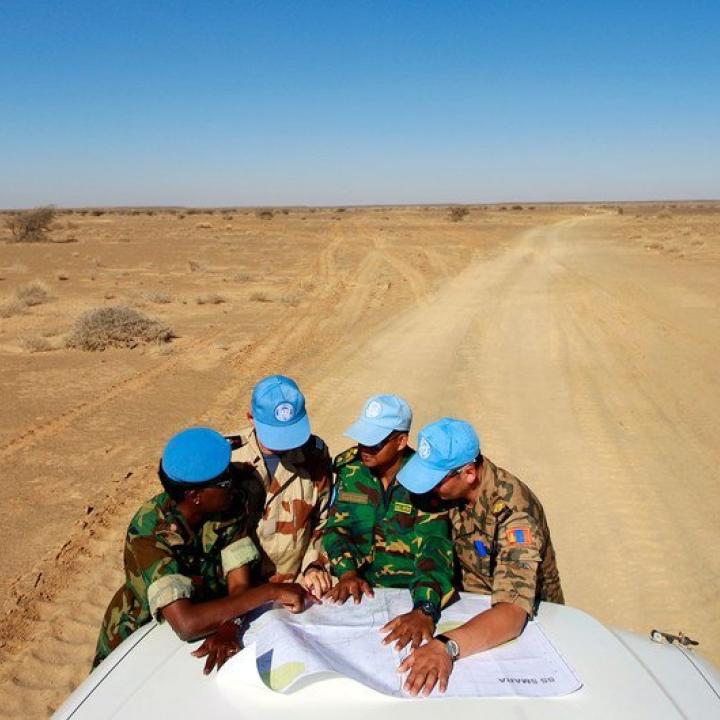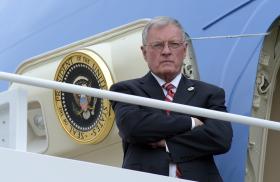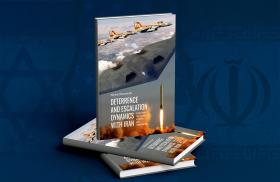
- Policy Analysis
- PolicyWatch 4109
Time to Pull the Plug on MINURSO? Not Quite

Despite Morocco’s growing diplomatic momentum and recent U.S. cuts to the UN peacekeeping budget, prematurely ending the Western Sahara mission would be a mistake given the important practical role it plays in maintaining the de facto ceasefire.
On October 31, the Security Council is set to decide on whether to renew the mandate of the UN Mission for the Referendum in Western Sahara (MINURSO). The annual vote comes in the context of broad UN peacekeeping cuts, significant political changes in the conflict over the disputed region of Western Sahara, and the fiftieth anniversary of the Green March, the November 1975 mass movement that launched Morocco’s effort to extend its control there. Together, these conditions could signal the Trump administration—the current penholder on MINURSO at the Security Council—that the time has come to substantially change or even end the force’s mandate. Yet this process needs to be conducted carefully and gradually to ensure that the small force’s outsize benefits on the ground are preserved during the transition, and to help secure buy-in from all engaged parties.
A Changed Mission and Diplomatic Climate
Following the 1988 ceasefire between Morocco and the Polisario Front—Western Sahara’s Algerian-backed secessionist movement—MINURSO was created in 1991 so that the territory’s indigenous Sahrawi people could exercise their right to self-determination by voting between independence or integration with Morocco. Yet irresolvable disagreements over voter eligibility foreclosed that process—the originally envisioned referendum is now politically unfeasible and has not been mentioned in relevant Security Council resolutions for two decades.
Meanwhile, MINURSO’s role has progressively shifted to ceasefire monitoring, which proved particularly helpful after hostilities broke out between the Moroccan military and Polisario forces in 2020. Yet critics have increasingly questioned the force’s annual renewal, arguing that its presence has become a symbol of diplomatic stagnation and mission creep.
In December 2020, President Trump decided to recognize Morocco’s claim to sovereignty over Western Sahara, prompting several other countries to follow suit. In July 2024, French President Emmanuel Macron stated that “the present and future of Western Sahara lie within Morocco’s sovereignty,” though he made clear that a mutually acceptable settlement in line with relevant Security Council resolutions remains the objective.
Since then, conditions have shifted even further in Rabat’s favor. This April, Secretary of State Marco Rubio reiterated U.S. recognition of Moroccan sovereignty during Foreign Minister Nasser Bourita’s visit to Washington. And in June, the United Kingdom endorsed Rabat’s long-preferred plan for Western Sahara—autonomy within the Moroccan state—as “the most credible, viable, and pragmatic basis for a lasting resolution of the dispute,” albeit while still describing the territory’s status as “undetermined.” With Washington, Paris, and London all supporting Morocco’s stance, the Polisario’s goal of an independent state has been dramatically weakened, increasing the likelihood of a major change during MINURSO’s next renewal vote.
Notably, this year’s vote also coincides with the Trump administration’s efforts to rescind more than $800 million in congressionally appropriated funds for UN peacekeeping missions. MINURSO has not been spared from the UN’s resultant liquidity crisis, despite being just one-twentieth the size of UNIFIL, the more well-known regional peacekeeping mission in Lebanon. The few hundred personnel that comprise MINURSO are already facing budgetary challenges that prompted them to limit recruitment, according to conversations with relevant officials. At minimum, U.S. officials appear poised to demand a deep overhaul of the mission and may even veto the renewal altogether.
How Morocco and Algeria View MINURSO
Although the conflict between the Polisario and Morocco has remained low-level in recent years, MINURSO plays a key role in preventing wider violence. Suddenly withdrawing the peacekeepers may therefore increase the risk of accidental escalation. For this reason—and because it benefits from the status quo—Morocco has never advocated ending the mission; rather, it has engaged in constructive cooperation with MINURSO.
Echoing Rabat’s views on resolving the conflict, the possibility of transforming MINURSO into a political mission has gained increasing attention of late, similar to the role UNAMI has played in Iraq. The aim of such a shift would be to facilitate negotiations toward an autonomous Sahara “province” within Morocco. Rabat’s recent diplomacy with Russia and China indicates that it is trying to secure full Security Council backing for both goals, though the prospect of them voting yes on Morocco’s autonomy proposal is distant given Moscow and Beijing’s strong relationships with Algiers.
Despite opposing Rabat’s stance on Western Sahara and supporting Sahrawi self-determination, Algiers does not want a vacuum or armed escalation there either. During the previous MINURSO renewal vote in 2024—Algeria’s first year as a non-permanent member of the Security Council—it proved a difficult interlocutor, pushing strongly for amendments that would better reflect its position (e.g., reinserting direct references to a referendum; adding a mandate for monitoring human rights). Ultimately, it grew exasperated and refrained from participating in the vote at all; indeed, the episode highlighted the lack of support for Algeria’s stance on Western Sahara, since all of its requested alterations were rebuffed and Moscow abstained from the vote as it had the year before. (Russia-Algeria relations are historically deep but not perfect, and Moscow is likely unwilling to go farther than abstention on this issue.)
Ahead of next month’s vote, Algiers knows that it is once again in a tough position. Fearing diplomatic isolation, it may be prepared to adopt a more pragmatic approach, as suggested by its measured reaction to the UK’s recent shift on Western Sahara compared to its vocal denouncement of previous shifts by Spain and France. How Algeria approaches these issues is important given the key role it plays in containing the Polisario.
Toward a Measured Approach
Although MINURSO has outlived its original referendum-focused mandate, it remains helpful in monitoring the de facto ceasefire between Morocco and the Polisario Front and maintaining calm. The time is therefore ripe to lay the groundwork for moving beyond the status quo while still reaping the practical benefits of keeping MINURSO operational. To jumpstart this gradual process, the United States and its partners should do the following:
- Clearly designate a U.S. point person on the issue. To enable a breakthrough on both MINURSO and Western Sahara, President Trump needs to assign this file to a senior administration figure for as long as it takes to resolve—preferably before next month’s renewal vote. This would enable serious dialogue not only with Morocco, but also with Algeria and, possibly, the Polisario. Notably, the administration has yet to send a senior official to Morocco for a visit, despite Trump’s advisor for Africa, Massad Boulos, traveling to Algeria in July.
- Encourage Morocco to articulate the details of its autonomy plan in preparation for potential Security Council endorsement. Rabat won the first battle by convincing the United States, France, the UK, and others that its 2007 autonomy proposal is the most realistic path to breaking the decades-long deadlock. Now it must turn this vision into a compelling, actionable framework that the global community can endorse. Secretary Rubio seemingly hinted at such a framework with his use of the phrase “genuine autonomy” during his April meeting with Bourita.
- Fully integrate Algeria into the discussions. Some observers have pointed out that the composition of the Security Council will become even more favorable to Morocco after Algeria rotates out in January. If possible, however, Washington would be much better off taking advantage of Algeria’s current presence on the council, locking in a MINURSO mandate change with official support from the player most capable of securing the Polisario’s peaceful acquiescence to ending the conflict. The UK and United States may be especially helpful in appropriately incentivizing Algerian officials to support this new approach—for example, convincing them that this could end the perception of Algerian sponsorship for a group that some in Washington consider a terrorist organization, thereby unlocking economic opportunities. Conversely, excluding them from the process would likely drive them to take a spoiler’s role.
- Strengthen U.S.-French cooperation on MINURSO and Western Sahara. During recent negotiations on renewing UNIFIL’s mission in Lebanon, U.S. discussions with Paris helped reach the best possible compromise on a difficult issue. While France and the United States have significant differences on certain aspects of Middle East policy, like recognition of Palestinian statehood, they are strong partners on other aspects, like the imposition of snapback sanctions on Iran. Western Sahara policy belongs firmly on the second list, since the two allies can use this issue to advance their common interests and secure a vital win in a difficult region.
Souhire Medini is a visiting fellow at The Washington Institute, in residence from the French Ministry for Europe and Foreign Affairs. Sabina Henneberg is a senior fellow at the Institute and director of its Junior Research Program.




